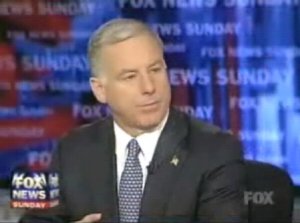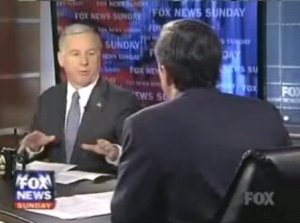

"Fox News Sunday" with Chris WallaceSeptember 10, 2006Chris Wallace, Host: Joining us now to look at what's happened since 9-11, is the head of the Democratic Party, former governor Howard Dean. And Governor, welcome back to Fox News Sunday. Governor Howard Dean, Chairman of the DNC: Thanks for having me on, Chris. Wallace: Let's start with the same question I asked Secretary Rice. Where, five years later, where are we in the war on terror? Dean: I think we're in trouble. We have not pursued the war on terror with the vigor that we should have, because we've gotten bogged down in the civil war in Iraq. What we ought to be doing is going after Osama Bin Ladin full scale. We ought to capture him, or kill him, and then we need to fight the terrorists which blew up the World Trade Center and killed 3,000 Americans. Wallace: Now you say that we're in trouble. How do you explain the fact that five years after 9-11, there has not been another attack on the U.S. homeland? Dean: Look, there has been improvement. We have done some things that we should have done in terms of improving our intelligence and so forth. But we proposed, the Democrats proposed, port security money, rail security money, airport security money, chemical plant security money. The Republicans turned it down. There's a lot of politics in this. We need to do a much better job. There was an article in the paper today, I'm sure you saw, that Secretary of Defense Don Rumsfeld said 'we don't want a post-war plan for the reconstruction of Iraq,' and then he threatened to fire any general who proposed one. We are not paying attention to what needs to be done. Today, or this week, northern Pakistan was written off by President Musharraf of Pakistan. They have now a treaty, that they won't go-- an agreement with the tribes that they won't go in and enforce their jurisdiction. This is-- Afghanistan is turning against us. That is where the fight on terror is. That's where Osama Bin Ladin is. Osama Bin Ladin has not been captured five years later. That's a big problem. 
Wallace: Lets's talk-- because you talk about the things that haven't been done. The White House, the Republicans counter that your party won't give the President the powers he needs to fight the war on terror. Let's take a look at the NSA warrantless eavesdropping program. Because after it was revealed, last December, you said-- and let's put it up on the screen-- "The Bush Administration's secret program to spy on the American people reminds Americans of the abuse of power during the dark days of President Nixon and Vice President Agnew." Do you really compare protecting the American people to Watergate? Dean: No, I compare protecting the American people to-- what the Bush administration has done to protect the American people, to some of the abuses of power that Nixon and Agnew were doing, which was listening in on Americans. Here's the problem-- Wallace: -- There's a big difference, though, isn't there, Governor? Dean: Well, there unfor-- Wallace: -- One was for political gain, and the other, even if you think it's being done wrong, is to try to protect America. Dean: Well, unfortunately, there's, as you said in the last section, there's "mission creep" here. We think it's a great thing to spy on Al-Qaeda. Of course we should spy on Al-Qaeda. The problem is, that's not just all they've been doing. It turns out they've had a broad-brush program so they can listen to everybody's phone calls if they want to. And they have. And now there's a protection set up to do that. You could do all the things the President's doing, and still obey the law and the Constitution, if you simply went and got a warrant. In fact, there's provision in the law that says you can get a warrant after the fact. So there's nothing the President can't do, within the scope of the 1976 law, that-- where he needs additional authority. And the Democrats have said they'll give him additional authority, but we've gotta base it on the Constitution. The Constitution's all that stands between us, and the people we're fighting against. Wallace: There are a couple of points here. First of all, I have had General Michael Hayden, the former head of NSA, now the head of the CIA, on this program. He says that in the NSA warrantless wiretap program, they never wiretapped, eavesdropped on a communication or a phone call unless there was probable cause to believe that it was terror related. That's point one. Dean: Well, if that's the case, why not go and get the warrant? Wallace: Well, all right. Here's the question. The Administration's argument is that they don't need to get a warrant, and that for reasons that they won't tell us, that they can't get a warrant. Arlen Specter-- Dean: --Which the court's now said is illegal. Wallace: Well, one court has said. Dean: That's right, one court has said it. Wallace: Arlen Specter, Chairman of the Senate Judiciary Committee, has got legislation in which the White House would go to the FISA Court, the Foreign Intelligence Surveillance court that is the expert on this, the court you talk about, to argue-- to review judicially, independently, whether or not this is a legal program, and the White House says it will go along with that legislation. Dean: Well, then we may have the makings of a deal. We'll have to-- I haven't seen the specific legislation. Here's what the Democrats want out of this. The Constitution is set up so that not one branch has all the authority. So if one branch has to do something to defend the United States of America, i.e. the executive branch, they have to check before they start spying on ordinary Americans. That's the whole purpose of the FISA Court. That's all we want. All we want is to make sure that we don't slide towards an imperial presidency, which is what the Nixon/Agnew problem was.-- Wallace: --If they [inaudible] independent judicial review-- Dean: -- that's correct. Then I'm very interested in that. I think you might get some Democratic support for that. Let's see what's in the Specter bill. I don't wanna speak for Congress. I don't know what's in the bill, but that's basically what we're looking for, a judicial review. Wallace: Aren't you Democrats playing with political fire here? I think back to 2002, when it was the Democrats who came up with the original idea for a Department of Homeland Security, and then got in a fight with the White House over the issue of [mock-incredulously] collective bargaining rights. And as a result, the Republicans were able to tar Democrats in that election effectively, got some Democrats like Max Cleland out, as being "soft on terror." If you block, or if you're seen as blocking the NSA warrantless wiretaps, or military tribunals, don't you run the risk of exactly the same thing happening in 2006? Dean: Well, you know, I think the Republicans have some risk here, too. Bill Clinton tried to expand wiretap authority, and the Republicans all wouldn't give it to him, when he was President of the United States. So there's always politics, and and you always have to watch politics on both sides. What the Democrats want here is not politics. We think the President has played too much politics. You know, the President's got rid of the CIA unit that was supposed to track down Osama Bin Ladin. Then in the last three weeks, he stepped that up again. We think there's a lot of politics in this. We think there's a lot of politics in the President's speeches. Every one every day, on terrorism. They think they can't win the elections unless they talk about terrorism all the time. We think we ought to talk about a new direction for the country. So there's always the risk of politics. But in defending the United States, the best thing to do is do what you think is right. We want to get the terrorists. We think the civil war in Iraq has become a distraction to getting the terrorists. And we do want our Constitution, our laws to be upheld, because that, as I said before, that's what stands between us and the people we're fighting against. Wallace: Let's talk about Iraq. Because I've been looking at what you have said over recent weeks, months, years, about U.S. troops in Iraq, and I'm trying to figure out where you stand. Let's take a look at this. 
Wallace: In December 2005, you said 'bring the 80,000 National Guard and Reserve troops home immediately'. This August you said that "I think most Democrats would agree that we ought to be out of there by the '08 elections." This week you said, "I'm with George Aiken, the wonderful Vermont Senator who once said about Viet Nam, 'Declare victory and get out.'" At various points you've called for getting out in 2007, getting out in 2008, getting out immediately. You can set the record straight here today-- Dean: --Sure. Wallace: -- on Fox News Sunday. When do you think that all U.S. troops should be out of Iraq-- Dean: -- Those actually quotes are all part of the same piece. The person who proposed getting the National Guard in Iraq-- National Guard and Reserve troops out, was actually a former Reagan defense official named Larry Korb. They have a plan to redeploy our troops, which I think is still a solid plan. I'm sure I did say at one point we could be out by the end of '07; that was probably a year and a half ago. Clearly the times have gone by... Wallace: -- When right now, do you think we can get all the troops out? Dean: The bottom line here, is the Democrats think we shouldn't be in Iraq, and the Republicans wanna stay there for as... forever, it seems to me. To leave this problem to the next President. We think, as a party, I'm speaking for the party now, we think we shouldn't be in Iraq, and we don't think we can withdraw our troops precipitously. I have also said, as a-- Wallace: -- So, so when would they all be out? Dean: -- I have said as an individual, there probably is a consensus, that we could leave Iraq and be out by the end of 2008, in the party. But that doesn't encompass every single party position. And there is a plan, that is widely accepted by both moderates and liberals and conservatives in the Democratic Party, that allows us to do that, and that plan was put together by a former Reagan defense official. Look. 60% of the American people think we shouldn't be in Iraq. They think it was a mistake, and I am one of those people. Wallace: And you don't see any problem if we pull out. You said we shouldn't be in Iraq, so if we just pull out of Iraq, over the course of the next two years... 
Dean: We have to have a phased redeployment. The first thing is, to bring the National Guard and Reserves home. The second thing is, we're not doing the job in Afghanistan. We don't have enough troops in Afghanistan. That's where the real war on terror is. That's where Osama Bin Ladin, 5 years after he killed 3,000 Americans, is still holed up. The Taliban is resurgent. We -- I admire Secretary Rice, but she is wrong about what's going on in Afghanistan. Things are significantly worse in Afghanistan today, because we don't have the manpower... There is a fascinating article in the Washington Post today, which says that President Bush pulled out the special ops forces who were chasing Osama Bin Ladin, so he could put them in Iraq. That is exactly why the Democrats think Iraq is a mistake. It is hurting our attack on the-- our attack on the terrorists. Wallace: -- We've got 30 seconds left. On a related subject, you piled on Karl Rove and the White House pretty good about the Valerie Plame leak case. Dean: Mm hm. Wallace: Let's put up what you said. You said the President should fire him, you said 'there is no question that Rove was the one'-- there it is-- [text on screen: "Not Guilty As Charged" and the quote] -- "there's no question that Rove was the one that leaked the information about the CIA agent's name." Governor, now that we've learned that Rove wasn't the one who leaked the name, that in fact the original source of the leak was Secretary-- Deputy Secretary of State Richard Armitage, are you gonna give Karl Rove an apology? Dean: Absolutely not. I still think he should be fired. Karl Rove discussed the name of a secret serv-- I mean, a CIA agent, at the time of war, with a reporter. You're not supposed to do that. And President Bush said that he would fire anybody who did; he did not do that. Look, we need a new direction in this country. We need a new direction to defend America, we need a new direction in the war on terror, we need to stop the Republican war on middle-class Americans who are having trouble sending their kids to college. We need a new direction. That's what the election is about. Are we going to have a new direction in this country, or are we gonna keep doing what we're doing? And I think the path we're going down is a big mistake. Wallace: Governor Dean, we're going to have to leave it there. Thank you-- Dean: Thank you. Wallace: -- thank you for sharing part of your Sunday with us. Dean: My pleasure.
Transcribed from videos on YouTube-- Part 1, Part 2, and a video on Crooks and Liars. |

.
.
 |
